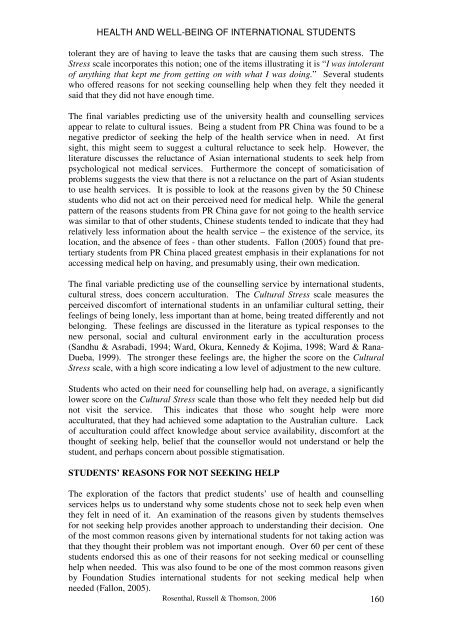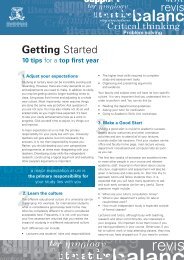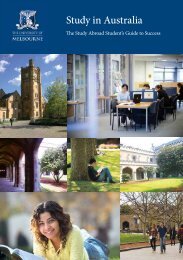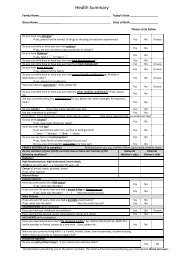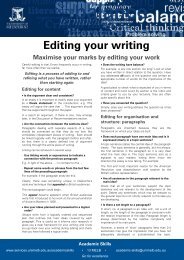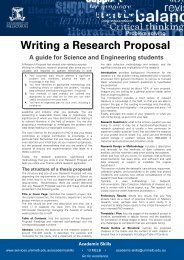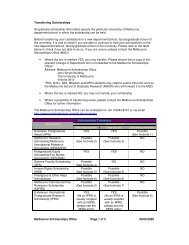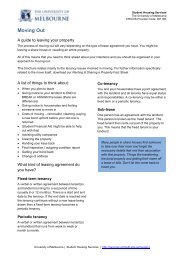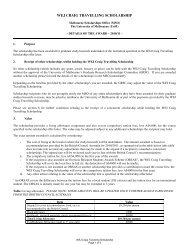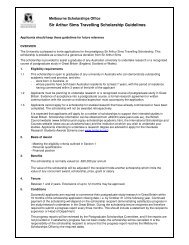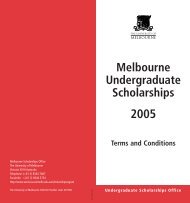a growing experience - Student Services - University of Melbourne
a growing experience - Student Services - University of Melbourne
a growing experience - Student Services - University of Melbourne
Create successful ePaper yourself
Turn your PDF publications into a flip-book with our unique Google optimized e-Paper software.
HEALTH AND WELL-BEING OF INTERNATIONAL STUDENTStolerant they are <strong>of</strong> having to leave the tasks that are causing them such stress. TheStress scale incorporates this notion; one <strong>of</strong> the items illustrating it is “I was intolerant<strong>of</strong> anything that kept me from getting on with what I was doing.” Several studentswho <strong>of</strong>fered reasons for not seeking counselling help when they felt they needed itsaid that they did not have enough time.The final variables predicting use <strong>of</strong> the university health and counselling servicesappear to relate to cultural issues. Being a student from PR China was found to be anegative predictor <strong>of</strong> seeking the help <strong>of</strong> the health service when in need. At firstsight, this might seem to suggest a cultural reluctance to seek help. However, theliterature discusses the reluctance <strong>of</strong> Asian international students to seek help frompsychological not medical services. Furthermore the concept <strong>of</strong> somaticisation <strong>of</strong>problems suggests the view that there is not a reluctance on the part <strong>of</strong> Asian studentsto use health services. It is possible to look at the reasons given by the 50 Chinesestudents who did not act on their perceived need for medical help. While the generalpattern <strong>of</strong> the reasons students from PR China gave for not going to the health servicewas similar to that <strong>of</strong> other students, Chinese students tended to indicate that they hadrelatively less information about the health service – the existence <strong>of</strong> the service, itslocation, and the absence <strong>of</strong> fees - than other students. Fallon (2005) found that pretertiarystudents from PR China placed greatest emphasis in their explanations for notaccessing medical help on having, and presumably using, their own medication.The final variable predicting use <strong>of</strong> the counselling service by international students,cultural stress, does concern acculturation. The Cultural Stress scale measures theperceived discomfort <strong>of</strong> international students in an unfamiliar cultural setting, theirfeelings <strong>of</strong> being lonely, less important than at home, being treated differently and notbelonging. These feelings are discussed in the literature as typical responses to thenew personal, social and cultural environment early in the acculturation process(Sandhu & Asrabadi, 1994; Ward, Okura, Kennedy & Kojima, 1998; Ward & Rana-Dueba, 1999). The stronger these feelings are, the higher the score on the CulturalStress scale, with a high score indicating a low level <strong>of</strong> adjustment to the new culture.<strong>Student</strong>s who acted on their need for counselling help had, on average, a significantlylower score on the Cultural Stress scale than those who felt they needed help but didnot visit the service. This indicates that those who sought help were moreacculturated, that they had achieved some adaptation to the Australian culture. Lack<strong>of</strong> acculturation could affect knowledge about service availability, discomfort at thethought <strong>of</strong> seeking help, belief that the counsellor would not understand or help thestudent, and perhaps concern about possible stigmatisation.STUDENTS’ REASONS FOR NOT SEEKING HELPThe exploration <strong>of</strong> the factors that predict students’ use <strong>of</strong> health and counsellingservices helps us to understand why some students chose not to seek help even whenthey felt in need <strong>of</strong> it. An examination <strong>of</strong> the reasons given by students themselvesfor not seeking help provides another approach to understanding their decision. One<strong>of</strong> the most common reasons given by international students for not taking action wasthat they thought their problem was not important enough. Over 60 per cent <strong>of</strong> thesestudents endorsed this as one <strong>of</strong> their reasons for not seeking medical or counsellinghelp when needed. This was also found to be one <strong>of</strong> the most common reasons givenby Foundation Studies international students for not seeking medical help whenneeded (Fallon, 2005).Rosenthal, Russell & Thomson, 2006 160


